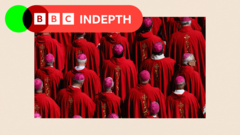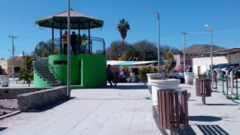In a short span, cardinals will gather at the Vatican’s Santa Marta guesthouse, filled with 128 rooms, to determine the future direction of the Catholic Church following the legacy of Pope Francis, who passed away shortly before the conclave. The red ribbon sealing one of the suites stands as a reminder of his impactful tenure, during which he appointed approximately 80% of the eligible voting cardinals. With unprecedented diversity—marking the first participation of cardinals from places like South Sudan, Papua New Guinea, and Rwanda—this conclave reflects the Church’s varying global realities.
Tensions and Diversity Shape Upcoming Papal Conclave

Tensions and Diversity Shape Upcoming Papal Conclave
As the Vatican prepares for the conclave to elect a new Pope, the influence of Pope Francis and the diversity of the participating cardinals signal significant changes ahead.
In preceding meetings, cardinals voiced their perspectives on the future of the Church while navigating divergent needs based on their regions. For instance, there is a discernible divide between the concerns of European cardinals, focused on reviving interest in an aging congregation, versus their African and Asian counterparts, who prioritize social justice issues such as poverty and conflict resolution.
As Pope, Francis expanded the role of the papacy beyond traditional boundaries, becoming a global advocate for the marginalized and a prominent statesman despite being the head of a small nation. Now, as cardinals consider their new leader, the emphasis is on continuity and clarity regarding the Church's stance on critical issues.
Pope Francis' vision of greater inclusion and engagement for lay Catholics, particularly women and LGBT+ individuals, poses challenges for the new Pope, whose task will include enforcing necessary reforms across an expansive and diverse Church. Debates among cardinals reflect wrestling with the balance between faithful adherence to tradition while engaging a contemporary world increasingly disengaged from religious authorities.
The cardinals face expectations of uniting the Church amidst lingering divides. As entry to the conclave draws near, the call for pragmatism, unity, and divine guidance resonates among those tasked with this momentous decision. With 133 electors shaping the Church's future, the outcome holds foundational implications for Catholicism on a global scale.
As Pope, Francis expanded the role of the papacy beyond traditional boundaries, becoming a global advocate for the marginalized and a prominent statesman despite being the head of a small nation. Now, as cardinals consider their new leader, the emphasis is on continuity and clarity regarding the Church's stance on critical issues.
Pope Francis' vision of greater inclusion and engagement for lay Catholics, particularly women and LGBT+ individuals, poses challenges for the new Pope, whose task will include enforcing necessary reforms across an expansive and diverse Church. Debates among cardinals reflect wrestling with the balance between faithful adherence to tradition while engaging a contemporary world increasingly disengaged from religious authorities.
The cardinals face expectations of uniting the Church amidst lingering divides. As entry to the conclave draws near, the call for pragmatism, unity, and divine guidance resonates among those tasked with this momentous decision. With 133 electors shaping the Church's future, the outcome holds foundational implications for Catholicism on a global scale.




















